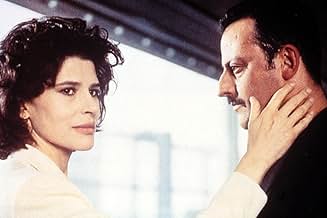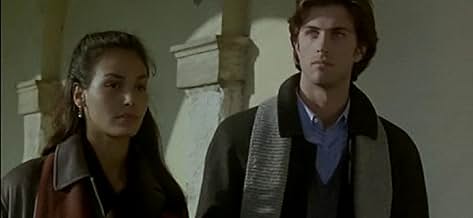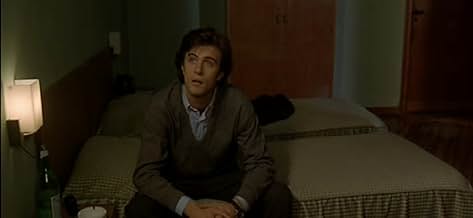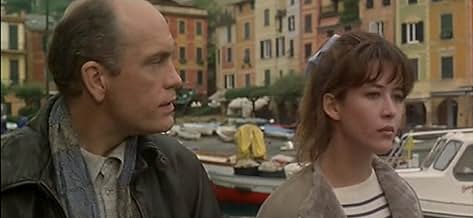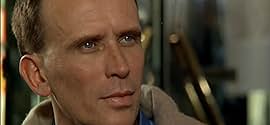AVALIAÇÃO DA IMDb
6,4/10
6,4 mil
SUA AVALIAÇÃO
Adicionar um enredo no seu idiomaFour stories about short or long relationships between men and women in Italy and France.Four stories about short or long relationships between men and women in Italy and France.Four stories about short or long relationships between men and women in Italy and France.
- Direção
- Roteiristas
- Artistas
- Prêmios
- 3 vitórias e 6 indicações no total
Kim Rossi Stuart
- Silvano
- (as Kim Rossi-Stuart)
Inés Sastre
- Carmen
- (as Ines Sastre)
Avaliações em destaque
A summing up of all the aging, ailing Antonioni's career themes, strengths (visual beauty, a sense of mystery and poetry) and weaknesses (pretentious stiff dialogue, ideas that are sometimes not really all that deep, a penchant for getting beautiful actresses undressed without a lot of justification).
But this is also something quite different than he's ever done, in that these are a series of short stories, loosely tied together by sequences of John Malkovich playing a director looking for his next film (Wim Wenders helped the physically limited Antonioni by directing the Malkovich sections).
By keeping the pieces smaller, I found this more fun, and more moving than most of Antonioni's films. There isn't the chance for the ideas to run as thin, and there seems to be more empathy for his characters now. Humans may be screwed up, but at least Antonioni no longer stands above them judging. One moment actually brought me near tears. The film captures the lonely enigmatic solitude of the artist, and of life itself.
But this is also something quite different than he's ever done, in that these are a series of short stories, loosely tied together by sequences of John Malkovich playing a director looking for his next film (Wim Wenders helped the physically limited Antonioni by directing the Malkovich sections).
By keeping the pieces smaller, I found this more fun, and more moving than most of Antonioni's films. There isn't the chance for the ideas to run as thin, and there seems to be more empathy for his characters now. Humans may be screwed up, but at least Antonioni no longer stands above them judging. One moment actually brought me near tears. The film captures the lonely enigmatic solitude of the artist, and of life itself.
Although I'm a big fan of his work, and specially his revolutionary masterpieces, I would say this film did not live up to my expectations regarding Antonioni's abilities. In one word, I found myself utterly bored. I could not bring myself to share any emotions with the characters (no matter how hard I tried) and finally gave up on watching it. Malkovich was poorly casted and instead of bringing warmth and real human emotions to the character, made it a drag and sometimes impossible to follow. There are no real links for this four short stories, and least of all Malkovich's ramblings and philosophical (attempts at best) remarks bordering on sunday sermons. If you want good quality film, better stick to the director's earlier works. Sorry!!!
For thirteen years after "Identification of a Woman" Michelangelo Antonioni was unable to make another film. However in 1995 he made a sudden return with "Beyond the Clouds" a collection of short stories linked by a film director (john Malkovich). Each film explores, with no real conviction or success the themes of desire,love and deception . At the time the film was hailed as a success, both Antonioni and wenders, who undoubtedly directed parts of the film, were praised. However on closer examination "beyond the Clouds" is far from a masterpiece although visually the images are beautiful all the stories are both implausible and without depth. The film fails in its attempts to explore complex human emotions. John Malkovich's character also fails to link the stories neatly and his ramblings are both pretentious and boring. The only story worthy of real praise is the final one starring Irene Jacob, always superb, who adds a touch of concision to an otherwise lost film. For those looking to explore the human emotions of love, desire, freedom , loss and loneliness would do far better to watch Krystof Kielslowski,s acomplished "Three colours" trilogy which cleary show the late Kielslowski to be far superior to Antonioni.
SPOILER: After the ecstatic reviews it received in the press, I found this film
disappointing. I can only imagine that the critics were being kind to an
ill, old man of 82 and overly respectful of the reputation of a once
great film director. Visually it is very attractive with beautiful shots of a lakeside
village and very atmospheric and poetic shots of alleyways and streets
in rain and mist. But when it comes to the actions and motivations of
the people in the film it is a let-down. I like to be able to believe in
and identify with the characters in a film and I couldn't do that here.
There are four stories in the film and I will mention only two - the two
that seem to me the most trite and pointless.
The first story stars two extremely good-looking newcomers to the screen
(Kim Rossi Stuart & Ines Sastre.) He stops his car to ask her the way to the nearest hotel, and because he
is so good-looking she gives him the name of her hotel. They see each
other during the day and when they retire to their rooms at night across
the landing from each other, she lies awake waiting for the knock on the
door that never comes. In the morning she leaves early without seeing
him. It is two years before they see each other again and this time
their relationship progresses a little further - they get to be naked on
the bed together. But he behaves in a very odd way indeed; for some five
minutes he runs his hands over her body within a millimetre of her skin
but without actually touching her. What she thinks is going on as she
lies there passively, feeling nothing, is anybody's guess. Then after
five minutes, still without having touched her, he gets up abruptly and
without speaking a word leaves. Is that the action of a sane man? You
wonder why he bothered to take his clothes off if he intended to do so
little. She, presumably feeling hurt and frustrated, rushes to the
window to see him walking off into the distance. They give each other a
feeble wave. End of story. John Malkovich's deep lugubrious voice-over
tells us that he behaved in this way either because of folly or pride.
Well it was certainly folly - and certainly unbelievable. Or could it
have been impotence? Could this story be saying something about the
impotence of an old man?
In another segment of the film, Malkovich's character is attracted to a
young woman (Sophia Marceau) he sees in a shop window. He can't take his
eyes off her and just stands there entranced. She reacts in the same
way. He goes into the shop and their silent fascination continues. I
felt uncomfortable for both of them. Was something momentous about to
happen? It would seem so and our interest is awakened, our expectations
aroused. But no; we are just being lead up the garden path to nowhere.
He sits outside and eventually she joins him. She tells him only one
thing about herself, that she has murdered her father by stabbing him
twelve times. Malkovich shows no surprise and the fact seems irrelevant.
They then go to her place and they have sex. But this is not the
beginning of some deep, meaningful relationship as the earlier
enchantment would lead us to suppose. Oh no. When he's had his sex he's
had enough and like the previous male protagonist, he just walks away.
Another wretched piece of behaviour and
disappointing. I can only imagine that the critics were being kind to an
ill, old man of 82 and overly respectful of the reputation of a once
great film director. Visually it is very attractive with beautiful shots of a lakeside
village and very atmospheric and poetic shots of alleyways and streets
in rain and mist. But when it comes to the actions and motivations of
the people in the film it is a let-down. I like to be able to believe in
and identify with the characters in a film and I couldn't do that here.
There are four stories in the film and I will mention only two - the two
that seem to me the most trite and pointless.
The first story stars two extremely good-looking newcomers to the screen
(Kim Rossi Stuart & Ines Sastre.) He stops his car to ask her the way to the nearest hotel, and because he
is so good-looking she gives him the name of her hotel. They see each
other during the day and when they retire to their rooms at night across
the landing from each other, she lies awake waiting for the knock on the
door that never comes. In the morning she leaves early without seeing
him. It is two years before they see each other again and this time
their relationship progresses a little further - they get to be naked on
the bed together. But he behaves in a very odd way indeed; for some five
minutes he runs his hands over her body within a millimetre of her skin
but without actually touching her. What she thinks is going on as she
lies there passively, feeling nothing, is anybody's guess. Then after
five minutes, still without having touched her, he gets up abruptly and
without speaking a word leaves. Is that the action of a sane man? You
wonder why he bothered to take his clothes off if he intended to do so
little. She, presumably feeling hurt and frustrated, rushes to the
window to see him walking off into the distance. They give each other a
feeble wave. End of story. John Malkovich's deep lugubrious voice-over
tells us that he behaved in this way either because of folly or pride.
Well it was certainly folly - and certainly unbelievable. Or could it
have been impotence? Could this story be saying something about the
impotence of an old man?
In another segment of the film, Malkovich's character is attracted to a
young woman (Sophia Marceau) he sees in a shop window. He can't take his
eyes off her and just stands there entranced. She reacts in the same
way. He goes into the shop and their silent fascination continues. I
felt uncomfortable for both of them. Was something momentous about to
happen? It would seem so and our interest is awakened, our expectations
aroused. But no; we are just being lead up the garden path to nowhere.
He sits outside and eventually she joins him. She tells him only one
thing about herself, that she has murdered her father by stabbing him
twelve times. Malkovich shows no surprise and the fact seems irrelevant.
They then go to her place and they have sex. But this is not the
beginning of some deep, meaningful relationship as the earlier
enchantment would lead us to suppose. Oh no. When he's had his sex he's
had enough and like the previous male protagonist, he just walks away.
Another wretched piece of behaviour and
Even though the story is light, the movie flows so beautifully and its visual so tranquil and poetic that it could almost carry the whole movie.
The film consists of four interconnected stories, all about different aspect of attraction between man and/or woman and how it frequently is ethereal. Their true desire seems to be always something that they cannot hold onto, it will flow out like a handful of sand.
I thought the most intriguing story was the last one where the more unattainable the woman was, the more the man desires her. It parallels her deep love for god, who is infinitely out of reach, but never closer to her heart.
A very good movie. 7/10
The film consists of four interconnected stories, all about different aspect of attraction between man and/or woman and how it frequently is ethereal. Their true desire seems to be always something that they cannot hold onto, it will flow out like a handful of sand.
I thought the most intriguing story was the last one where the more unattainable the woman was, the more the man desires her. It parallels her deep love for god, who is infinitely out of reach, but never closer to her heart.
A very good movie. 7/10
Você sabia?
- CuriosidadesIn order to obtain the covering insurance needed to put the film into production, Michelangelo Antonioni (who was still recovering from a severely debilitating stroke) had to agree to have a secondary director on staff, ready to take over from him at any time. His choice, Wim Wenders, even provided the prologue and epilogue for the film.
- Versões alternativasThere are two slightly different versions of the movie, the difference ocurring at the end. The US version of 'Beyond The Clouds' (Al di là delle nuvole, 1995) lacks the complete voice-over narration by John Malkovich's character at the end of the movie, from the moment he enters the hotel until the last image, before going to credits. The only line heard is: 'The director's profession is very peculiar...'; whereas the European cut of the movie contains a longer narration, also starting with the same line, but expanding until the last image before fading to credits. The voice-over talks about how the director's profession is to find images, only to discover another image beneath the previous one which is more faithful to the truth, and then another, and another, until you reach the one which equals reality, the one no one will ever see. Both versions are equally powerful in their own right, though it's interesting to note such a minor difference was made in the first place. Both versions are available, the US version was released in DVD, and the European version is available in VHS only.
- ConexõesFeatured in Fare un film è per me vivere (1995)
- Trilhas sonorasUnknown Love
Written by Lucio Dalla and Robert Sidoli
Performed by Giuseppe D'Onghia (as Beppe Donghia) (piano) and Lucio Dalla (clarin)
Principais escolhas
Faça login para avaliar e ver a lista de recomendações personalizadas
- How long is Beyond the Clouds?Fornecido pela Alexa
Detalhes
- Data de lançamento
- Países de origem
- Idiomas
- Também conhecido como
- Beyond the Clouds
- Locações de filme
- Empresas de produção
- Consulte mais créditos da empresa na IMDbPro
Bilheteria
- Faturamento bruto nos EUA e Canadá
- US$ 31.738
- Fim de semana de estreia nos EUA e Canadá
- US$ 12.596
- 5 de dez. de 1999
- Faturamento bruto mundial
- US$ 31.738
- Tempo de duração
- 1 h 50 min(110 min)
- Cor
- Mixagem de som
- Proporção
- 1.66 : 1
Contribua para esta página
Sugerir uma alteração ou adicionar conteúdo ausente

